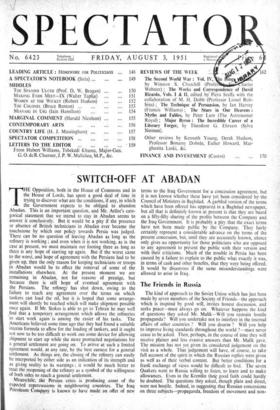SWITCH-OFF AT ABADAN
THE Opposition, both in the House of Commons and in the House of Lords, has spent a good deal of time in trying to discover what are the conditions, if any, in which - the Government expects to be obliged to abandon Abadan. This is an important question, and Mr. Attlee's cate- gorical statement that we intend to stay in Abadan seems to answer it conclusively. But it would be a pity if the presence or absence of British technicians- in Abadan ever became the touchstone by which our policy towards Persia was judged. There can be no question of leaving Abadan as long as the refinery is working ; and even when it is not working, as is the case at present, we must maintain our footing there as long as there is any hope of starting up again. But if the worst came to the worst, and hope of agreement with the Persians had to be given up, then the only reason for keeping technicians or troops in Abadan would be to effect the removal of some of the installations elsewhere. At the present nloment we are remaining in Abadan, not for reasons of prestige, but because there is still hope of eventual agreement with the Persians. The refinery has shut down, owing to the failure to reach any agreement over the terms on which tankers can load the oiL- but it is hoped that some arrange- ment will shortly be reached which will make shipment possible once again. If Mr. Stokes is able to go to Tehran he may well ,find that a temporary arrangement which allows the refineries WI start work again is among the easier of his tasks. The Americans believed some time ago that they had found a suitable interim formula to allow for the loading of tankers, and it ought not now to be too difficult to work out some device for allowing shipment to start up while the more protracted negotiations for a general settlement are going on. To arrive at such a limited agreement would, at any rate, be the best earnest for a general settlement. As- things are, the closing of the refinery can easily be interpreted by either side as an indication of its strength and as giving reality to its warnings ; it would be much better to treat the reopening of the refinery as a symbol of the willingness of.both sides to reach.a general settlement.: . • Meanwhile, the Persian crisis is producing some _ of the expected repercussions- in neighbouring countries. The Iraq Petroleum CompanY is known to have made an offer of new terms to the Iraq Government for a concession agreement, but it is not known whether these have yet been considered by-the. Council of Ministers in Baghdad. A garbled version of the terms which have been offered has appeared in a Baghdad newspaper, but all that is definitely known at present is that they are based on a fifty-fifty sharing of the profits between the Company and the Iraq Government. It is probably a pity that the exact terms have not been made public by the Company. They fairly certainly represent a considerable advance on the terms of the present concession, but, until they are accurately known, silence only gives an opportunity for those politicians who are opposed to any agreement to present the public with their version and with their criticisms. Much of the trouble in Persia has been caused by a failure to explain to the public what exactly it was, in terms of cash and other benefits, that they were being offered. It would be disastrous if the same misunderstandings were allowed to arise in Iraq.






























